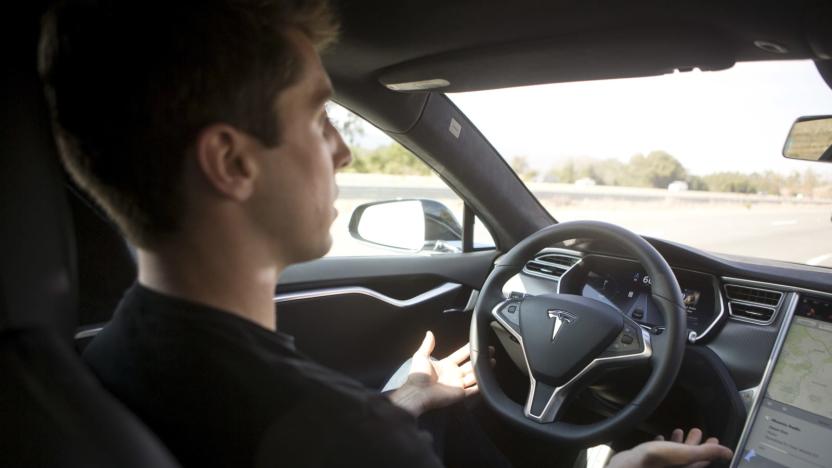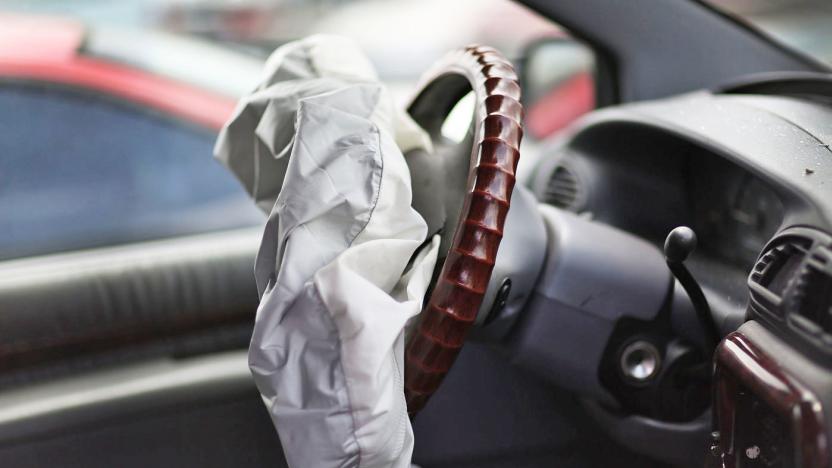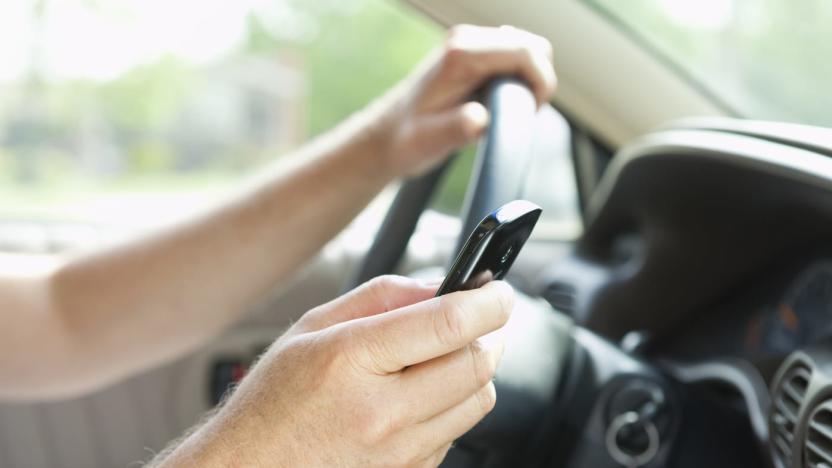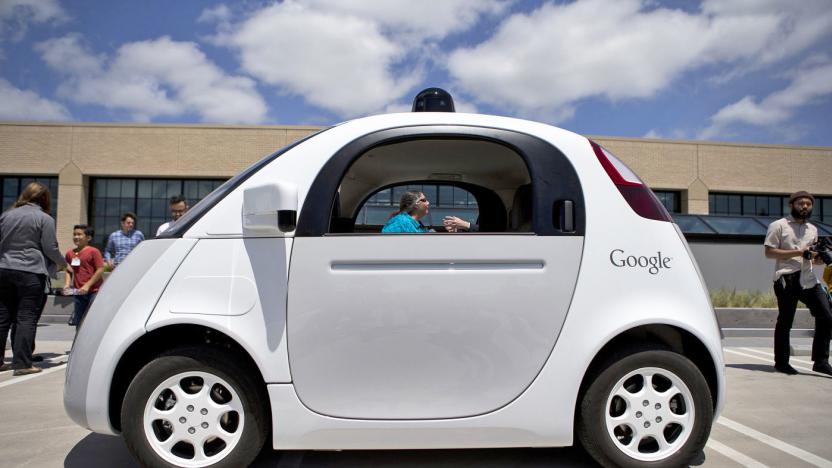nhtsa
Latest

ICYMI: The US Government wants to limit big rig speeds
try{document.getElementById("aol-cms-player-1").style.display="none";}catch(e){}Today on In Case You Missed It: The National Highway Traffic Safety Administration is proposing to mechanically limit the speed of buses and semis over 26,000 pounds to under 68 miles per hour. The idea focuses on safety concerns but also would improve fuel efficiency.

US mulls speed-limiting devices for buses and big rigs
Large vehicles like buses and big rig trucks are just as much of a safety concern as everyday cars, and US regulators think technology might be the key to saving lives. The NHTSA and FMCS have proposed installing speed-limiting devices on big commercial vehicles (those with a weight rating over 26,000lbs) to both reduce the chances of a crash and minimize damage when an accident happens. It could help with fuel efficiency and durability, too, by discouraging lead-footed drivers.

Regulator: Tesla crash shouldn't hinder self-driving research
If you thought that officials would halt progress on self-driving cars in the wake of a Tesla Autopilot crash in May, you're in for a surprise. National Highway Traffic Safety Administration lead Mark Rosekind told guests at an event that he and other regulators don't plan to slow down the development of autonomous vehicle hardware. To him, the car business "cannot wait for perfect" -- people have to be "desperate" for any technology that could save lives. He isn't touching the Autopilot crash specifically (the NHTSA is still investigating), but it's reasonable to say that he doesn't currently see the tragedy changing his stance.

Police confirm DVD player found in Tesla Autopilot wreck
A day after we learned that the National Highway Traffic Safety Administration (NHTSA) is investigating a fatal crash involving Tesla's Autopilot feature, more details have emerged. The Florida Highway Patrol confirmed to Reuters that a portable DVD player was found in the wreckage. The driver of the truck that was crossing the highway when it was struck by the Model S told the Associated Press that the driver was playing a Harry Potter movie at the time. He said he could he could hear it playing after the car hit a telephone pole further down the road.

Tesla under investigation after first Autopilot-related death
The NHTSA (National Highway Traffic Safety Administration) is investigating a collision that occurred when a Tesla Model S in Autopilot mode crashed into a tractor trailer resulting in the death of the driver. This is the first fatality linked to the automaker's vehicles while in the semi-autonomous driving mode.

Takata is reportedly recalling another 35 million airbag systems
If your car wasn't affected by Takata's massive airbag inflater recalls, it might be very shortly. Wall Street Journal tipsters hear that the Japanese firm is planning to recall "at least" 35 million more airbag inflaters, possibly as soon as this week. While the makes and models haven't been named, this would more than double the US recalls of 28.8 million airbag systems (over 40 million worldwide) from over a dozen car builders -- it may be hard to escape. The focus is on airbags that use ammonium nitrate to expel the airbag, but don't have a drying agent to prevent the moisture that triggers explosions.

The government is shaming people for texting and driving
It's a bad idea to text and drive. Beyond just being dangerous, it's now illegal in most US states and in several countries around the world. Yet, despite the many ad campaigns telling them it's wrong, people still do it. In fact, some of them actually brag about it on social media. Well, the National Highway Traffic Safety Administration will have none of that. The government agency has actually taken to Twitter to name and shame those who publicly confess to using their phone while behind the wheel:

Car makers ask the US to slow down on rules for self-driving tech
You might think that car brands would want governments to approve self-driving cars quickly so that sales can start as soon as possible, but it turns out that they're quite cautious. The Global Automakers industry group (which includes numerous heavyweights) used a public hearing on April 8th to ask US officials to slow down while crafting regulations for autonomous driving tech. Supposedly, the National Highway Traffic Safety Administration is moving too quickly by pushing for finished guidelines by July. It's tying itself to "arbitary, self-imposed deadlines" instead of allowing "robust and thoughtful" analysis, the industry says.

US regulators: Google's self-driving car AI 'can be a driver'
US regulators say Google's self-driving car can be considered the driver under federal law -- a big step towards approval for self-driving cars to take to the roads. Safety regulators apparently told Google of its decision last week. Google submitted a proposed design for a self-driving car back in November, which has "no need for a human driver" The response from the National Highway Traffic Safety Administration (NHTSA) was that will "interpret driver' in the context of Google's described motor vehicle design as referring to the [self-driving system] and not to any of the vehicle occupants."

US regulators delay law that will make electric cars more noisy
Electric cars are famous for how quiet they are compared to regular gas-guzzlers. This is good for noise pollution, bad for pedestrians -- especially the visually impaired. Manufacturers are well aware of the issue, and solutions like Toyota's proximity notification system are becoming more popular. What's not in place, yet, is industry-wide legislation to ensure all EVs and Hybrids have such a safety feature built-in. A law requiring cars have automatic audible alerts for pedestrians proposed in 2013 is in process, but Reuters reports the U.S. Department of Transportation that's just been delayed until at least March next year -- it was originally planned to come in to action this fall. The law would cost automakers an estimated $23-million in the first year to implement.

Anti-drunk driving technology won't start the car if you're smashed
The National Highway Traffic Safety Administration's anti-drunk driving technology won't let you get away with driving sloshed -- it won't even let you start the car. At a recent event, the agency has revealed the prototype of two candidates for the Driver Alcohol Detection System for Safety (DADSS) tech that it's been developing since 2008. One is an unobtrusive breathalyzer mounted either on the steering wheel or the driver-side door that can "smell" your breath even if you don't lean in closely. The other is a touch sensor embedded in an ignition button or a gear shift that scans your finger for your Blood Alcohol Content (BAC). Both car add-ons are capable of detecting whether your BAC is beyond the legal limit of 0.08, and both of them are designed to keep you from taking the car anywhere if that's the case.

New app tells you if you're too drunk to drive, helps call a cab
If you need your cellphone to decide if you've had one too many, that's probably a sign you should call a cab or car service. Nevertheless, the state of Maryland has just launched an app (funded by the federal National Highway Traffic Safety Administration), that will tell you your approximate blood alcohol content (BAC), test your reflexes and even help get you home safely. If you're a 130-pound woman who had a glass of wine, for instance, it'll show about a .04 BAC -- one drink below the limit, and already an unsafe level for the road. It'll also test your reaction time with memory games and a simulator that makes you brake for pedestrians. When the app determines you've had too many (or any, for that matter), it'll get you the number for a cab or preset designated driver. An official said the goal is to take the "brainwork" out of drinking and add some common sense to situations where none may exist. [Imaged credit: Charly Triballeau/AFP/Getty Images]

US government wants tighter controls for in-car navigation
Many are in favor of rules that prevent texting while driving, but in-car navigation is a murkier legal area -- how do you minimize distractions without limiting the ability to get from point A to point B? Like it or not, the US government may settle that debate before long. The proposed Grow America Act would let the National Highway Traffic Safety Administration (NHTSA) set rules for dash-mounted GPS units, smartphone mapping apps and anything else you'd use for driving directions. While it's not clear what the NHTSA would do with its power, the Department of Transportation's voluntary guidelines ask for limits on eye-catching visuals (think videos) and interaction times; don't be surprised if these enter the rulebooks.

The government wants our cars to 'talk' to each other
The US Department of Transportation (DOT) is throwing its weight behind vehicle-to-vehicle (V2V) communication systems. After years of experimentation and a real-world trial in Ann Arbor, MI the government is (almost) ready to make peer-to-peer networking a required safety feature on all new cars. The National Highway Traffic Safety Administration (NHTSA) has announced that it'll "begin taking the next steps" towards implementing V2V, though, what those steps are is still somewhat shrouded in mystery. One major detail left to be ironed out is when exactly these new safety standards will go into effect. The agency is currently finalizing its analysis of the data gathered during the Ann Arbor trial, which it will then use to build a regulatory proposal. For those that don't know, V2V systems allow cars to share information about their position, speed and heading with each other and alert a driver when there is potential for danger. That could be a car speeding through an intersection ahead or a truck in your blind spot when trying to change lanes. While there is potential for integration with automated collision avoidance technology in the future, initially the DOT will be focused on passive systems. If you're concerned about the government having yet another avenue through which to track you, breathe easy. The data passed between vehicles includes no personally identifiable information. In fact, it doesn't even identify the car -- it only contains basic safety data. In addition to that, the NHTSA envisions multiple layers of security and privacy protection to ensure vehicles are sending and receiving reliable data.

Tesla formally recalls more than 29,000 Model S wall charging adapters
Tesla may argue that it's being proactive by replacing Model S wall charging adapters, but that still constitutes a recall by most anyone's definition. Accordingly, the company has sent a letter (PDF) to the NHTSA announcing a voluntary recall of the 29,222 first-generation adapters that theoretically pose a fire hazard. As before, Tesla stresses that the adapter replacement program is a "precautionary measure" -- an earlier software update addressed the underlying problem by accounting for unexpected changes in power input. The formal notice doesn't change much (if anything) for Model S drivers, but it at least means that the right authorities are aware of what's happening.

Musk stands behind Tesla Model S safety, modifies warranty to cover fire damage
Tesla's growing at home and abroad, as customer demand continues for it's Model S sedan -- even while the EV's gotten some negative publicity due to a few cars catching fire after being wrecked. So, to ensure that there is no "false perception about the safety of electric cars," Elon Musk has requested that the National Highway Traffic Safety Administration investigate these fires. This is the same governmental testing body that performs crash tests on all cars driven on US roads, that previously found that the Model S is the safest car it's ever evaluated. Should anything turn up from the NHTSA looking into the recent fires, Tesla will, quite naturally, make the necessary fix to new models and retrofit the old ones for free. Furthermore, the company's also updated its warranty to cover Model S fire damage, even if it's the driver's fault. The one limitation on that very generous offer? You can't be actively trying to destroy the car. Makes sense to us.

Tesla crash tests prove Model S is the safest car on the road
The Tesla Model S' all-electric infrastructure is being credited with a heck of a lot more than top-notch energy efficiency. Because of the design, the vehicle lacks a large gasoline engine block up front, boosting the "crumple zone" and ultimately saving lives during an otherwise deadly crash. As a result, the sedan scored a combined record of 5.4 stars during a recent National Highway Traffic Safety Administration (NHTSA) test. That figure is higher than the maximum published rating of 5 stars, but Tesla received a more comprehensive report detailing actual results. The Model S also earned high marks with its rear-crash, side-pole-intrusion and rollover tests. Additionally, the lithium-ion battery did not catch fire at any time, and it never has in a Roadster or Model S -- the same can't be said for certain competitors.

US Transportation agency backs public use of self-driving cars, urges states to adopt legislation
The key to road safety may lie in self-driving cars. That's the general conclusion of the National Highway Traffic Safety Administration's recently released policy report which urges states to draw up legislation that encourages testing of automated autos. Currently, only three states (i.e., California, Nevada and Florida) have enacted laws that permit companies like Google to operate these vehicles on public roadways. But the NHTSA hopes that with more state-backed adoption, advances in vehicle-to-vehicle communication and automatic braking can more quickly be refined, thus paving the way for industry standards and eventual commercial deployment. The agency, an arm of the US Department of Transportation, is also conducting its own research into V2V systems and driver guidelines for self-driving cars; the first phase of which is set to play out over a four-year period. For now, though, it still has a few additional hurdles to overcome, namely consumer perception (the NHTSA estimates self-driving cars could reduce crashes by 80 percent) and possible WiFi interference from the whitespace spectrum freed up by the FCC. Though the NHTSA's sights are clearly set on an automated vehicle future, it's yet to determine whether or not inclusion and use of that tech will be mandated.

US Department of Transportation posts guidelines for reducing in-car distractions
We all know by now that directly interacting with a phone while driving is a very bad idea. There are many more potential distractions at play in a car, however, and the US Department of Transportation has just published the first phase of guidelines to help infotainment device and vehicle makers keep drivers' eyes on the road. Many of them are logical recommendations for avoiding text, video and the web while on the move, although the federal agency suggests curbs that would surprise those with cutting-edge rides. While the DOT agrees that hands-free calls are safer, it still sees an added degree of risk from using them; it's not a big fan of GPS systems that introduce 3D or photorealism, either, as they potentially distract from the navigation at hand. The current guidelines aren't hard and fast rules, but it's clear the DOT will be watching companies closely -- and when the advice is just one part of a three-part series, we'd expect close scrutiny of phones and other mobile devices before too long.

Deputy Administrator of NHTSA joins Google as Director of Safety for Self-Driving Cars
El Goog has been experimenting with autonomous vehicles for a while, and now it's hiring a government man to help handle the red tape and get them on the roads. Ron Medford will be leaving his job as second in command (Deputy Administrator) at the National Highway Traffic Safety Administration (NHTSA), and joining the search giant in January as the Director of Safety for Self-Driving Cars. Google's prototype robot chauffeurs have navigated over 300,000 miles of US road, but to graduate from the testing stage will require just as much regulatory expertise as it will tech smarts. That's where Medford comes in, who will be paying close attention to the NHTSA's multi-year project to define standards for self-driving cars, which started only recently. Now, hopefully, we won't have to wait as long for those stressful journeys as pilot to become relaxing jaunts as fleshy cargo. [Image Credit: Getty Images / Brendan Hoffman]













